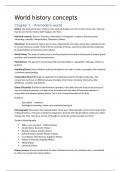World history concepts
Chapter 1 – Premodern world
History: the study of the past. ‘History is the study of change over time in the human past’. The past
may be over, but its history itself changes over time.
Historical research: Sources, Discovery, information, Investigation, evidence, Reconstruction,
chronology, causality, Interpretation, Discussion, Debate
Historicism: Each period in history has its own unique beliefs and values and is best understood only
in its own historical context. These internal meanings of history need to be discovered by historians
by dissecting the circumstances and contexts.
World History The study of history from a world perspective focusing on the spread of people, goods
and ideas and increased interconnectedness.
Methahistory: The quest for all-encompassing meaning, Patterns, regularities, Teleology, History as
progress.
Interdisciplinarity Several distinct academic disciplines are used to create a synergetic effect towards
a common understanding.
Comparative Research Design An approach to conducting research through comparison. This
comparison can focus on different groups of people, time frames, locations, themes but also
definitions, concepts and theories.
Global Citizenship The field of World History operates in the belief that the study of the process of
ever-increasing connections can help in the formation and education of future generations of
responsible and informed global citizens. This is the cosmopolitan ideal of the field.
Problems:
- Speculative – evidence?
- Teleological reasoning, based on its purported end/goal
Historiography: Discussion about interpretation of the past, Historiography concerns the study of the
writing of history., It focuses on historical arguments, theories and interpretations of the past, which
change over time. How have schools of thought on particular events changed over time?
Trends in historiography
States, wars and men – Political History
Social History, Economic History
Women’s History, Gender History
Cultural History and the History of Ideas
Local History, Microhistory, Subaltern History
History of Animals, Disability History
World History
Universal History
Primary sources Sources produced at the time of historical events, by contemporaries, unmediated
by others in ex post facto interpretation.
, Secondary sources Sources produced after the historical events containing interpretation and
assessments which are part of the debate of history.
Meta-History The interpretation of history according to an overarching meaning or internal logic,
leading towards an ultimate end point.
Modernity A set of ideas focused on rationality, science, secularism, democracy and
cosmopolitanism. It reflects both a time frame in which these ideas came about and gained traction,
at the end of the eighteenth century, as well as an outlook on the world as either pre-modern and
modern.*
Enlightenment The Enlightenment is an intellectual and scientific movement in the seventeenth and
eighteenth century in which scientists and philosophers aimed to establish dominance over natural
phenomena. By using reason and rational deduction, increased insights could be gained into the
workings of the natural world and humans living within it. The malleability of nature also resulted in
policies aimed at ‘enhancing’ and ‘purifying’ the human race.
Democracy System of government by the people for the people.
Chapter 2 – Communication: The writing revolution
Meaningful communication: the deliberate act of transforming information through a verbal (speech
or writing) or non-verbal (such as drawing, movement, object) medium.
Oral history: the study of history through orally transmitted sources. – speech. The study of history
through orally transmitted sources. Historians distinguish between sources which are part of an oral
tradition and the field of Oral Literature, such as epic poetry or folklore, and oral sources which
recount only a one generational/individual memory of certain historical events. Such life stories and
interviews are recorded after the historical events have occurred, and as such provide a testimony of
both the past and the present. At the same time, they offer historians evidence of otherwise
undocumented events or perspectives.
Civilization: a complex society bound together by common rule, sharing a common territory, identity,
means of communication and religion.
Epistemology The approach to knowledge and how to arrive at it, taking into account its foundations,
methods, and validity.
Culture The ideas and practices that award meaning to activities in human societies.
Chapter 3 – Trade: the ancient silks roads
Silk Roads Concept used to describe the trade routes connecting, via land and sea, Asia, Europe and
Africa.
The Great Game Concept used to describe the rivalry between the British and Russian Empires in the
nineteenth century over control of the central Asian landmass.
World System Theory The world is divided into three sets of states depending on the role they play in
economic production: Core-countries, semi-periphery and periphery countries. Core countries rely on




